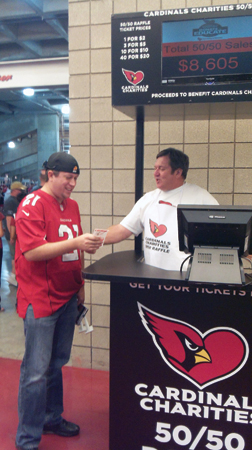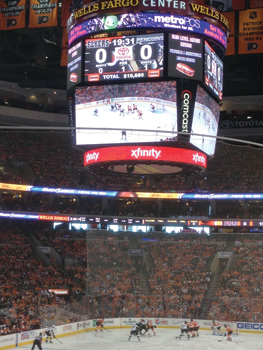NFL teams are approaching charity raffles cautiously now that the NFL, historically opposed to fans gambling on its product, has given the green light for clubs to run the raffles at their stadiums.
As late as fall 2011 the NFL prohibited such “50-50 raffles,” which split their pot evenly between a winning ticket buyer in the crowd and a charity. The drawings have gained a foothold in other big league venues, especially NHL arenas, where pots can reach into six figures.
 |
The Cardinals became the first NFL team to launch.
Photo: POINTSTREAK 5050 |
But the league has softened its stance, starting last season when it approved a five-year deal between the Arizona Cardinals and Pointstreak 5050, a technology company producing tablet software that automates the traditional 50-50 drawing.
The NFL modified its position as more teams and leagues were presented with the option of raising money for their charities through 50-50 drawings, league spokesman Brian McCarthy said.
After the 2012 season, the NFL developed some ground rules for 50-50 raffles and left it up to the individual teams to decide whether to run those programs, McCarthy said. “We provided some guidance, but we don’t have a position on it,” he said.
Before starting a raffle, a team must submit its details to the league, which are reviewed and approved by the NFL’s legal staff, McCarthy said. The guidelines require that all 50-50 proceeds must benefit a charitable organization and prohibit the team from keeping any money tied to the raffle.
In addition, NFL clubs, unlike teams in other leagues, are not allowed to sell sponsorship of raffles. Plus, all raffles must be executed at team events, McCarthy said.
The 50-50 raffle is considered a form of gambling in many states, though in some cases a legally acceptable one. In the eyes of the NFL, the charitable tie-in allows teams to run those contests at arm’s length, and because the raffles bear no relation to what’s happening on the field, the line between them and sports gambling that the NFL has long fought against is clear.
Pointstreak 5050, based in Toronto, has deals with multiple NBA, NHL, MLB and MLS clubs, three PGA Tour events, a pair of NASCAR tracks and three NCAA schools, but the Cardinals are its only NFL client to date. Kevin Lovitt, president of Pointstreak Sports Technologies, Pointstreak 5050’s parent firm, said the company has had conversations with, among others, the Buffalo Bills, Carolina Panthers, Cincinnati Bengals, Cleveland Browns, Jacksonville Jaguars and Seattle Seahawks.
Bump 50:50, a Pointstreak competitor that also calls Toronto home, has provided product demonstrations for a few NFL teams but no deals have been signed, said Dan Tanenbaum, the company’s president. Bump 50:50 has deals with five NHL teams and three NBA clubs, including the Winnipeg Jets, who average $84,000 a game in total raffle sales, Tanenbaum said.
Tickets generally cost around $3, with discounts given for multi-ticket purchases.
The size of the crowds at NFL games gives teams the potential to generate significant revenue for the foundations and charities that each club supports, Lovitt said. But it’s not as easy as it sounds. The laws governing raffles vary depending on the state, and sometimes new legislation must take effect to clear legal barriers before teams can run raffles. California, for example, home to the Oakland Raiders, San Diego Chargers and San Francisco 49ers, prohibits 50-50 raffles, Lovitt said.
 |
In Philadelphia, the running total for the pot is displayed on the center-hung scoreboard.
Photo: POINTSTREAK 5050
|
In Pennsylvania, the law was changed in late 2012, in large part because of lobbying efforts by Comcast-Spectacor, owner of the Philadelphia Flyers (see story below) and their arena, Wells Fargo Center. Lovitt, an attorney, said he helped write the legislation for the bill, which went into effect Dec. 26. The law does not cover NFL team raffles, and an amendment would have to be made before the Philadelphia Eagles and Pittsburgh Steelers could run 50-50 drawings at their stadiums. To this point, Pointstreak has not had those discussions with the two NFL teams, Lovitt said.
Kroenke Sports Enterprises, owner of the Colorado Avalanche and Denver Nuggets, launched its Pointstreak program at Pepsi Center in early April after spending almost two years ironing out the complexities of a system in which the nonprofit Colorado Amateur Hockey Association holds the raffle license.
Under Colorado law, Kroenke Sports Charities is not recognized as a membership organization under the state rules for nonprofit groups so Kroenke Sports Enterprises had to sign an agreement with CAHA to run the raffle, said Kurt Schwartzkopf, Kroenke Sports chief marketing officer. Ownership’s goal is for its charity group to acquire a license and run the raffle on its own, which will take five years through a change in its bylaws, Schwartzkopf said.
“We have been working closely with the secretary of state’s office to make sure we execute flawlessly and adhere to all state laws,” he said.
But a clear legal pathway doesn’t guarantee entrance into an NFL stadium. The Chicago Bears decided against running a raffle at Soldier Field next season after having initial discussions with Pointstreak 5050, the same vendor the Chicago Cubs use for their 50-50 drawing at Wrigley Field.
“It was simply a club decision,” Bears spokesman Scott Hagel said. “We chose not to take advantage of this specific opportunity to raise money.”
One downside in the NFL is frequency: Despite the sizable crowds, teams have only eight regular-season home games a year, unlike the 41 to 81 home dates in basketball and baseball, which greatly reduces the opportunities to sell raffle tickets, Lovitt said.
In addition, the NFL’s restriction against teams selling sponsorships of raffle programs could be giving teams pause when considering these deals, regardless of the cause, he said. A key component of Pointstreak 5050’s technology is the ability for teams to post a running total on scoreboards to drive raffle sales at stadiums and arenas. In the NFL, doing so would take away valuable real estate for teams that would otherwise pocket the revenue generated by selling advertising space on those screens, Lovitt said.
Flyers fans spend average of $3 a head on raffle
Over the past 18 months, Bump 50:50 has increased its business from one team, the St. Louis Blues, to eight NBA and NHL clubs. Pointstreak 5050 in the past 12 months has tripled its list of big league clients, from seven to 21 teams.
The Philadelphia Flyers, one new account, averaged about $55,000 in raffle sales over their first 18 home games after signing a deal with Pointstreak.
“Watching the pot grow on the scoreboard drives the whole program,” said Peter Luukko, president and chief operating officer of Comcast-Spectacor, owner of the Flyers and their arena. “Otherwise, it would be a fraction of what it is at the end of the night.”
To date, Flyers fans are spending an average of $3 a head on the raffle at Wells Fargo Center, Luukko said. The per cap in Philly is $1 to $1.25 higher than Pointstreak’s six other NHL clients, said Kevin Lovitt, president of Pointstreak Sports Technologies.
In Philly, the Flyers “seed” the pot for every home game by providing the first $5,000 to jump-start raffle sales. Other teams do it occasionally for a big game or on opening night, according to the teams and vendors.
“People buy tickets early and the pot is at $20,000 by the end of the first period, and it just grows from there,” Luukko said. “It’s one of the most exciting game features we’ve had in years.”
— Don Muret
None of that dissuaded the Cardinals, who began their Pointstreak program for the final three home games of the 2012 season at University of Phoenix Stadium, generating revenue of $14,000, $17,000 and $19,000, Lovitt said. Half the proceeds went to charity.
Those totals are a few thousand dollars above per-game averages posted by MLB’s Atlanta Braves and Cincinnati Reds with their raffles in 2012, and well below the $40,000 pots the Pittsburgh Penguins and Tampa Bay Lightning reported for some games this season.
In Canada, where 50-50 raffles are ingrained in its sports culture and fans do not have to pay taxes on their winnings, the Calgary Flames, a Pointstreak client, average sales of $60,000 to $70,000 a game, Lovitt said. The World Juniors tournament run by Hockey Canada, the sport’s governing body in that country, has reported raffle sales of $300,000 for its 2010 event.
One difference that Lovitt found critical in the NFL is the tailgating culture, which unlike other sports provides a window for teams to reach thousands of fans outside the stadium walls. From Lovitt’s experience helping the Cardinals start their program last fall, the bulk of raffle sales were transacted early in the parking lots on game days. In the NHL, by comparison, many hockey fans buy raffle tickets after entering the arenas and during intermissions between periods, especially after they see the running totals escalate on video boards.
“There is no magic bullet. You have to work at it,” Lovitt said. “The NFL is different. Every Sunday it’s like the circus comes to town. You must have a strategy to hit the tailgate areas three hours before kickoff. There has to be a commitment from ownership.”
Despite the NFL’s shift on raffles, the Cardinals would not talk about their deal, perhaps an indication of teams’ sensitivity regarding the subject of gambling in any form.
Other NFL teams in talks with Pointstreak 5050 were tight-lipped on the issue. “We are still in the evaluation stage, so it is inappropriate to comment at this point,” Jaguars President Mark Lamping said in an email.
One nonprofit with close ties to the Bengals and a group that has had talks with Pointstreak 5050 gave a big thumbs-up to the potential windfall for its organization.
“It would be a great opportunity for any charity to be a part of this,” said Barbara Dundee, executive director of the Marvin Lewis Community Fund, named for the Cincinnati Bengals’ head coach, who founded the group in 2003.
“I have had talks with the Bengals about [a raffle] but they have not agreed at this point to do anything so I can’t tell you where it’s going to go.”





